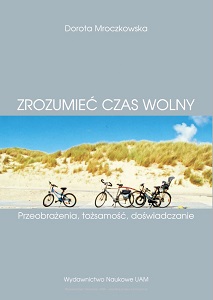(Z)rozumieć czas wolny. Przeobrażenia, tożsamość, doświadczanie
Understanding Leisure. Transformation, Identity, Experience
Author(s): Dorota Mroczkowska
Subject(s): Social Sciences, Sociology, Social development
Published by: Wydawnictwo Naukowe Uniwersytetu Adama Mickiewicza
Keywords: free time; leisure; transformations; identity; experience, border and boundary areas;
reflectiveness; everyday life; technology; globalisation
Summary/Abstract: The idea of the book: Understanding Leisure. Transformations, Identity, Experience is to attempt to understand leisure in its core dimensions related to change, identity, and experience. It is essential to create a comprehensive picture of leisure as a cognitive, interactive, symbolic and emotional category, rather than creating the fundamental definition and way of thinking about it. Taking inspiration from such theoretical orientations as symbolic interactionism, phenomenology, existentialism, sociology of everyday life (Berger, Luckman 1983; Kelly 1972, 1996, 2003, 2012; Kelly, Godbey 1992; Giddens 2001, 2003; de Certeau 2008, 2011; Kaufman 2013), inspiration from the psychology of experience (Csikszentmihalyi 2005), postmodernism (Rojek 1995, 2005, 2010), and also border theories (Nippert-Eng1996; Zerubavel1991), allows leisure to be thought of as a dynamic, socially and culturally variable category, located at the intersection of micro and macro social processes, and associated with the dynamics of individuals' experiences. At the same time, referring to the reflexive methodology enables us to maximize perception and understanding of leisure by using various research methods and techniques (Strauss 1993; Shaw 1997; Dupuis 1999; Freeman 2001; Giddens 2001; Fischer-Rosenthal 2005; Feighery 2006; Denzin, Lincoln 2010). The aim of the first part, Transformations, is to look at the historical and social processes of leisure. The following chapters of this part is related to essential processes that characterize and stimulate its development and transformations, such as industrialization, urbanization, mass media and technology, commercialization, globalization, and acceleration. These processes have contributed to the situation today where we are faced with several questions, problems, or challenges concerning the identity of leisure, which in turn will be discussed in the second part, entitled The identity. As the reader will notice, the aim of this section is not to revolutionize thinking about leisure. I also do not want to come down on the side of a crisis or outdated sociology of leisure. Above all, I want to refer to the key processes within the sub-discipline that, in connection with the evolution of the theory and practice of leisure, and the transformations taking place in contemporary reality, make it possible to reflect on its status. The third part of the book, Towards the Method, aims to present research assumptions based on a hermeneutical-interpretative perspective and a reflexive methodology. The fourth part entitled: Experience, is based on my longitudinal studies, and introduces the reader to the meanings, experiences and emotions of leisure performed in various situational contexts. In the subsequent chapters of the book, analyses of different types of research material are combined, and the methods and techniques used deepen the accumulated knowledge. I refer to existing data: the North American and the European surveys and time-budget studies, international comparative research, and smaller European research projects, as well as surveys and budget studies in Poland. On the other hand, I refer to my research projects, which were conducted in Poland and are based on qualitative methodologies, and explore the everyday understanding of leisure. The book is written from a local perspective, and the main points of reference are the two dominant traditions of leisure - the American and the European schools. It is worth emphasizing that the category of leisure is not universal, but is assigned to a particular cultural, geographical, and historical formation called modernity. Leisure becomes essential in a particular type of society and constitutes one of its essential aspects.
- E-ISBN-13: 978-83-232-3643-6
- Print-ISBN-13: 978-83-232-3642-9
- Page Count: 304
- Publication Year: 2020
- Language: Polish
- eBook-PDF
- Table of Content
- Introduction

